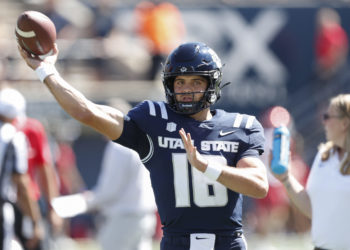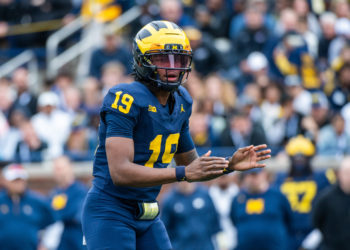Just before the July Fourth holiday, we learned that President Donald Trump secretly claimed a power so dangerous that even King George was prohibited from using it.
The claim came in a series of identical letters that Attorney General Pam Bondi sent to 10 leading tech companies on April 5 — each instructing the company to ignore Congress’s law effectively banning TikTok in the United States. The letters, released in response to a Freedom of Information Act request, consist mostly of weakly argued claims about why companies do not have to stop hosting TikTok on their platforms (as the legislation explicitly requires).
But when put together, those claims amount to a frighteningly raw assertion of power: that the president can exempt specific companies from complying with legislation if he believes it interferes with his control over foreign policy.
This is called the “dispensing power.” It was an old prerogative of English kings, one in which they could simply assert that the law doesn’t apply to their friends (a power not limited to foreign affairs). Dispensations were basically proactive pardons, telling someone they can feel free to ignore specific laws and never suffer any consequences.
The dispensation power was so sweeping, and so anti-democratic, that it was abolished by name in the 1689 English Bill of Rights. In 1838, the US Supreme Court ruled that the president does not have dispensing power — a ruling that modern legal scholars across the political spectrum treat as obviously correct.
Bondi’s letters seem to directly contradict this basic principle of constitutional law.
“The effect [of the letter] is to declare an almost unbridled dispensation power when it comes to foreign relations,” says Alan Rozenshtein, a law professor at the University of Minnesota Law School who has been closely following the TikTok case.
The Bondi letters have gotten virtually no attention outside of dedicated legal blogs and podcasts. And yet the implications of Trump claiming a dispensing power — the ability to issue licenses for lawlessness — are stunning.
How Bondi’s letters claim dispensing power
The Bondi letters are very short — about six paragraphs. They do not directly assert a dispensing power, but instead confusingly mash together multiple different legal claims without spelling out how they fit together into a coherent argument. During our conversation, Rozenshtein asked to be described as “spittle-flecked with rage” at the letters’ technical legal incompetence.
Inasmuch as there is a cogent argument, it appears to be something like this: The president has unilateral power under Article II of the Constitution, which defines the powers of the executive branch, to determine whether legislation would (in Bondi’s words) “interfere with the execution of the President’s constitutional duties to take care of the national security and foreign affairs of the United States.”
If Trump determines that legislation might “interfere” with his conduct of foreign affairs, Bondi suggests, he can bindingly promise individual corporations or people that the administration will not take any legal action against them for violating its provisions.
On its surface, this argument seems like a mashup of two relatively normal presidential prerogatives: the ability to assert that a statute contradicts presidential power and the ability to use discretion in enforcing it. But if you look more deeply, it looks less like those normal claims and a lot more like dispensation.
The Supreme Court has indeed held that legislation can unconstitutionally interfere with Article II powers, the most notable recent case (2014’s Zivotofsky v. Kerry) overturning a law requiring that US passports list “Israel” as the birthplace for US citizens born in Jerusalem.
However, this doesn’t mean that all legislative constraints on the president’s foreign policy powers are unconstitutional — far from it. And there is no credible case that the TikTok ban contravenes Article II. In fact, the Supreme Court unanimously upheld the TikTok ban’s constitutionality in January.
Presidents are also widely understood to have discretion in how they enforce the law. There is far more lawbreaking than there are Justice Department attorneys to prosecute offenses; given scarce resources, presidents and attorneys general have to make choices about which crimes to prioritize.
This discretion can give rise to tricky gray area cases. Barack Obama, for example, ordered the Justice Department to stop immigration enforcement actions against undocumented migrants brought to the US as children. There is a robust debate over whether this is a legitimate use of discretion, as the Obama administration argued, or an abuse designed to usurp Congress’s lawmaking power.
But the TikTok case, legal experts say, is very different. There’s no issue of enforcement or limited resources; before Trump issued his exemptions, Apple and Google had already removed TikTok from their US app stores. So this isn’t a decision of non-enforcement, in the sense of redirecting law enforcement resources.
Rather, it was giving big tech platforms a blank check to ignore a law they had previously complied with — which is, essentially, an assertion that the president has a version of the dispensing power that English kings lost centuries ago.
Just how dangerous are the letters?
To understand how scary these letters are, it’s worth considering an analogy: the pardon power.
The pardon power is eminently, and famously, abusable. Because the president can forgive any federal crime (at least theoretically), he can dangle pardons in front of anyone he wants to break the law — promising them that he’ll make sure they get away with it.
But the pardon power only covers criminal offenses, not violation of the civil code. Jack Goldsmith, a leading expert on presidential power at Harvard Law School, reads Bondi’s letters as claiming the power to proactively forgive civil violations. This would, in effect, allow the president to authorize whole new categories of illegal conduct, provided he can find a sufficient foreign policy-related excuse.
At the moment, it does not appear that this sweeping reasoning is being employed for anything other than giving companies cover to violate the TikTok ban. But as Goldsmith notes, executive power assertions typically function like one-way ratchets: Once used successfully, presidents turn to them again in the future.
“There is an immense danger in Bondi’s assertion of a dispensing power here—that it might set a precedent for assertions of the same authority in future cases in which the dispensations are far less popular and far more corrupting,” writes Steve Vladeck, a law professor at Georgetown University and author of a newsletter on the Supreme Court.
I have to admit, at this point, that I’d mostly been tuning out the debate over the lawfulness of the TikTok ban. It struck me as yet another in a long string of technical arguments over presidential non-enforcement, one that applied to law that it seems many in Congress regret ever passing.
But after reading Bondi’s letters, and studying their legal implications, I’ve started to see this as fundamentally different. This case isn’t about TikTok, not really; it’s about Trump being able to make an obviously unconstitutional power grab in secret and get away with it — as he very well may, as Rozenshtein believes the letters’ claims will be hard to challenge in court due to standing issues.
It’s a situation that looks especially dangerous in light of his broader agenda.
“Trump, unlike [previous] presidents, has clearly expressed, in word and deed, his disregard of any limits on his powers to do pretty much anything he wants to do,” writes David Post, a legal scholar at the libertarian Cato Institute. “It gives each individual act of malfeasance — such as ‘nullifying’ a federal statute — a much, much more sinister resonance.”
The post Trump quietly claimed a power even King George wasn’t allowed to have appeared first on Vox.




